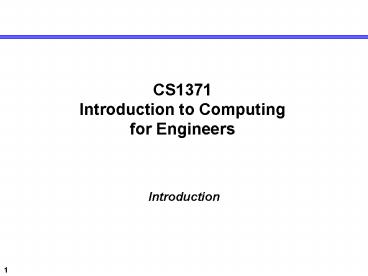CS1371 Introduction to Computing for Engineers - PowerPoint PPT Presentation
1 / 23
Title:
CS1371 Introduction to Computing for Engineers
Description:
Matlab online help. Course notes on web page. 6. Course Software. Personal productivity ... Help Desk in the CoC (details later) Senior TA (STA) your TA's ... – PowerPoint PPT presentation
Number of Views:26
Avg rating:3.0/5.0
Title: CS1371 Introduction to Computing for Engineers
1
CS1371Introduction to Computing for Engineers
- Introduction
2
Course Introduction
Learning Objectives How we will administer this
class
- Outline
- Purpose of this class
- What do we want you to learn?
- Lessons for this class?
- Summary
3
What is the Purpose of CS1371?
- Computing for Engineers
- Learn computing in the context of engineering in
a course that is taught by engineers - Goals
- Illustrate the value of computing and computer
programming in engineering. - Provide an opportunity to you to get excited
about engineering and how engineers solve
problems. - Learn how to continue learning how to program.
- Have fun!
4
What Do WE Want You to Learn?
- On the completion of this course we expect you
- to understand fundamental programming concepts,
- to apply concepts of problem solving to
engineering problems, - to be able to design and implement simple
computer programs in MATLAB to solve engineering
problems, - to understand how to approach other computer
languages, - to create reports using Microsoft Office, and
- to learn how to continue learning how to design
and write programs and to use the computer
effectively in solving problems in engineering.
5
Course Reference Material
- Matlab
- Introduction to Scientific Computation and
Programming (Daniel T. Kaplan), Thompson Books - Matlab online help
- Course notes on web page
6
Course Software
- Personal productivity
- Microsoft Office 2k or Office XP
- Available on Campus Computers
- If you want your own, purchase at GT Bookstore
- Matlab
- Student Version 7.0 (Release 14)
- same as professional version without Toolboxes
- includes Symbolic Toolbox (Maple)
- Purchase at BN_at_GT or Engineers Bookstore
- Available on Campus Computers
- Professional version
- Many Toolboxes
NOTEBoth PC and Mac versions are available
7
Resources
- Course Web Page
- http//www.cc.gatech.edu/classes/AY2005/cs1371_sum
mer/ - Downloads /lecturesWDL/index.html
- WebWork more later
- Georgia Tech Resources
- http//www.gatech.edu
- Search Engines
- http//www.askjeeves.com
- http//www.google.com
- http//www.excite.com
- Matlab
- http//www.mathworks.com
8
Who Are We?
Who Dan Colestock - Course management Email
danc_at_cc.gatech.edu (send email only from your
prism (gt) account and include CS1371 in the
subject line) Office CoC 347
9
Who Are We?
Who Bill Leahy - Instructor Email
bleahy_at_cc.gatech.edu (send email only from your
prism (gt) account and include CS1371 in the
subject line) Office Room 113, College of
Computing. AIM ethereal bleahy Office hours
Mon, Wed 115 - 215 Tue, Thu 145 - 245
10
Two Scheduled Sessions
- Lecture
- Tuesday, Thursday. Two lectures back to back!
- Lecture presented by Course Instructor.
- Held in a large lecture hall (CoC 16)
- Quizzes will be in lecture
- Recitation
- Wednesday
- Led by your Teaching Assistants (TA).
- Smaller group setting geared for questions and
answers (no new material will be presented).
11
Two Types of Homework
- Homework
- Due approximately every week.
- Typically Matlab programming.
- Labs
- Due approximately every other week.
- Covers skills such as Email, news, HTML, Excel.
- These are still just homework they have nothing
to do with a laboratory. The name is an artifact
of days gone by
12
Reading from Text
- You are expected to read the text
- Some quiz questions may come from the reading
material
13
Graded items
- Homework numerous covering Matlab.
- Labs about 5 or 6 covering computer skills such
as Email, News, Excel, HTML, etc. - Quizzes 3 quizzes given during the large
lecture, dates 6/2, 6/21, 7/12 - Final exam consult OSCAR for published date
time, but subject to change!
14
Course Grading Breakdown
Grading Breakdown (there is no
curve) HW 15 Labs
5 Quizzes(3_at_15each) 45 Final
35 ------- 100
15
Collaboration
- We will separate Learning Tasks from Assessment
- Homework/Labs are geared to help you learn and
master the material. - Quizzes and the Final Exam are used to give the
majority of the assessment of your ability. - We are encouraging an open and collaborative
learning environment for homework and labs. - More on this in the coming lectures.
16
Real Live Help
- In addition to the online resources for this
course, numerous people are available to help
you. - Please seek help from the following
- TA (or newsgroup)
- Help Desk in the CoC (details later)
- Senior TA (STA) your TA's supervisor
- Instructor
- You always have the right to see your
instructor!!!
17
Some Tips
- For many students this will be your first REAL
exposure to Computer Science (unlike Math,
Chemistry, etc.) - Some of the topics will be VERY hard to grasp at
first, especially some of the fundamental
concepts! (it does get easier) - You cant learn simply by reading or cramming
you MUST struggle with the programs and work the
homework! - Dont rely on always asking somebody when you
figure it out for yourself, youll remember it!
18
Some Tips
- Programming (English Writing math
logic) - syntax (i.e. grammar)
- (creativity
rigidity) - making mistakes
- a lot of work (i.e.
assigned work) - extra work (i.e. more
practice)
19
Tip 1
Dont wait until the last minute to get help
20
Tip 2
Hey, can I pass if I can get enough partial
credit?
Bad things happen while learning a new skill.
You will probably crash and burn on some
programs. Start early leave yourself time for
mistakes.
21
Tip 3
Dont be too ambitious with your course load.
You CANNOT slack off in this class, even for a
few days.
22
Questions?
23
(No Transcript)































